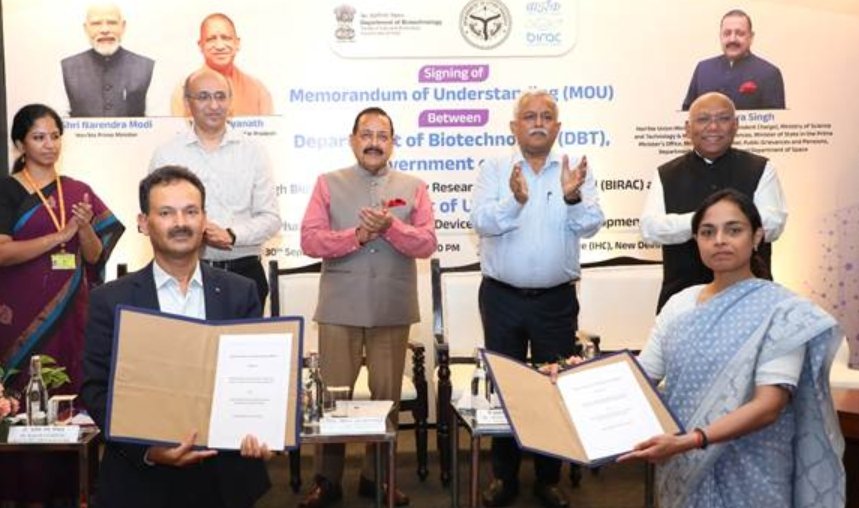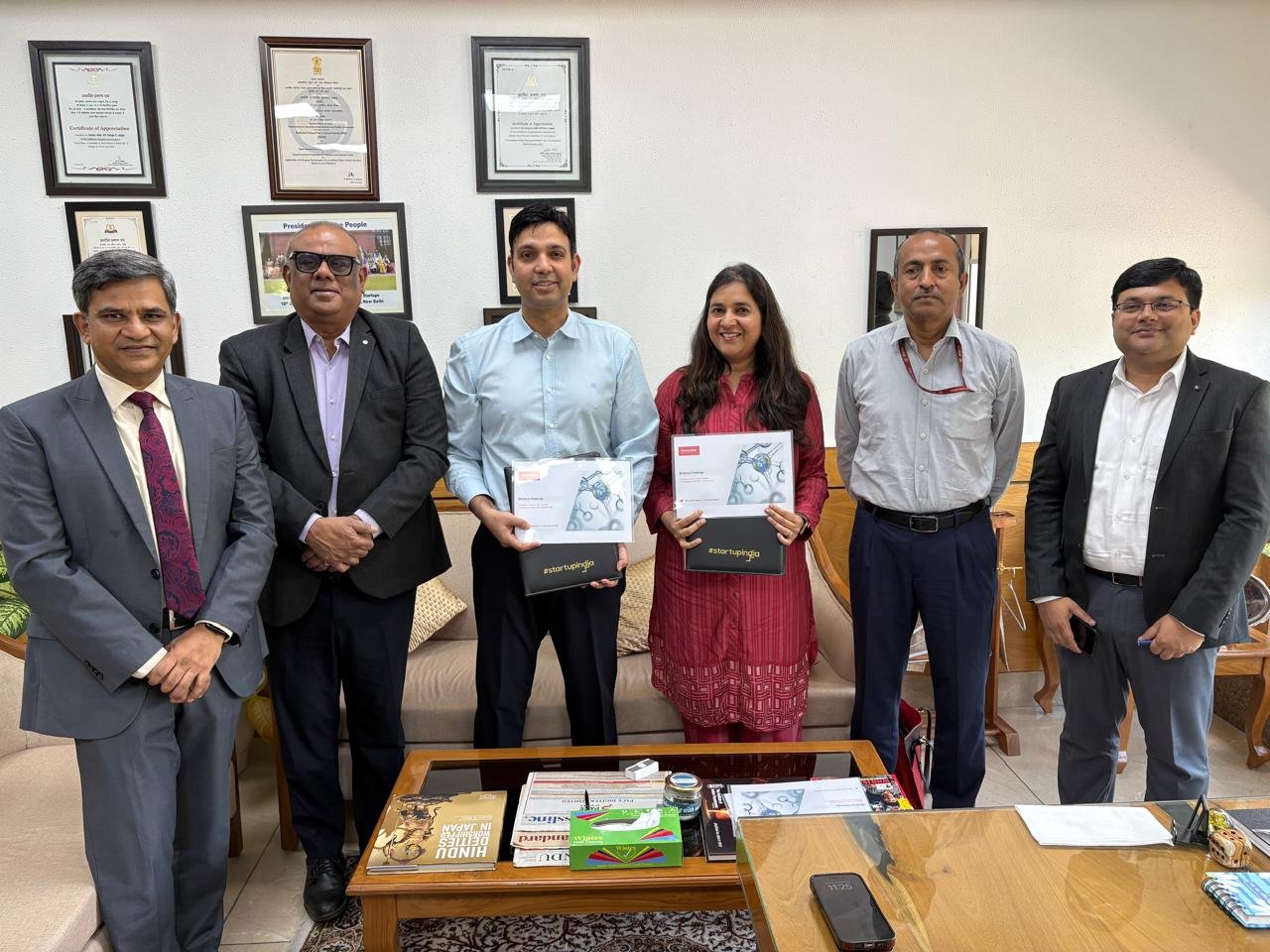Hottest new start-up: Denovo Biolabs
November 06, 2015 | Friday | Features | By Rahul Koul Koul
Hottest new start-up: Denovo Biolabs
(Photo Courtesy: www.bigthink.com)
Erected in 2013, Denovo Biolabs is located in India's Silicon Valley - Bangalore, incubated at IBAB campus.
The start-up is involved in product development through R&D and innovation for laboratory diagnostics and medical research.
"We develop quality immunological tools to serve the unmet demands of the industry," voices Mr Manjunath.
Luckily, Mr Manjunath didn't start all alone. The other founders who joined in his endeavor are Mr Rishikesh Kumar, and Mr Dinesh Kumar Saini.
Mr Manjunath and Mr Dinesh formerly worked as senior scientists with Abexome Biosciences. Mr Rishikesh was employed with Molecular Connections and Quintiles Technologies.
Entrepreneurial Triggers
As students at IBAB, Mr Manjunath and Mr Dinesh were constantly exposed to various entrepreneurial activities, lectures and networking opportunities.
Explains Mr Manjunath, "Once we knew the profile of our company, the first step was to solve the financial requirements, which were resolved with our personal funds and investors. For our infrastructural requirements, IBAB's director Prof Yathindra and Dr Gayatri Sabrewal played a pivotal role. Once the infrastructure were in place, the necessary registrations, approvals and other documentations which were required were put in place. The laboratory set-up was a big step ahead which helped the R&D activities, and as a result yielded in quality products for the company."
Denovo is in the process of developing biopharmaceutical technologies to deal with global healthcare needs in terms of accessibility and affordability of drugs.
It also develops ELISA (enzyme-linked immunosorbent assay) tools for quantitative estimation of biopharmaceutical drug level, such as humanized monoclonal antibodies (mABs) and recombinant proteins.
"We provide end-to-end, cost-effective pharmacovigilance solutions to pharmaceutical, biotechnology and medical device companies. We also provide wide range of customized services to academic institutions. We are working towards affordable cancer diagnostics which will help in early detection of cancer and the betterment of societal health," reveals Mr Manjunath.
Starting Troubles
Initially, the founders faced the humongous task of convincing investors for funding.
"Getting a suitable infrastructure to initiate the R&D activities was a challenge. Then came the R&D and product development challenges accompanied by providing high quality products, product placement in the market and being ahead of competitors," adds Mr Manjunath, who enjoys travel and exploring mysterious places.
At a deeper level, he gets more specific about the challenges faced by Denovo during its journey. "Initial procurement of reagents, chemicals and instrument and getting them on time was challenging. Just getting an equipment for our R&D took one whole year which delayed our product development significantly.
"Logistics and shipping arrangements for our temperature-sensitive products, both domestically and internationally, posed major obstacles. Other challenges were getting the required certifications and approvals, and hiring capable manpower," he notes.
Through personal funds and investors, the company has invested Rs 50 lakh in Denovo in various phases as per requirements.
Post two years of its establishment, at the moment, Denovo is faced with challenges of raising more funding to scale-up its R&D and production activities, channels to reach global clients, and partnering with global distributors to reach global markets.
In India, he says, most investors will not sign an approval unless the start-up has something fully prototyped. "VCs expect for higher and quicker returns on investment," he stresses.
Well, how does one explain VCs and investors about investing biotech start-ups? Mr Manjunath recommends, "To begin with, a business concept should be easily understood by the VC. The offering itself needs to be clarified precisely about what the company is offering to buyers or clients. VCs must make rational and unbiased assessments of the demand for the products which states the need for the product in the market or the industry. The start-up needs to explain the value of the specific product or service and must be made evident to investors."
Denovo has already started exporting its products to Germany and hopes to have a worldwide presence soon as it is in talks with potential clients in other countries.
It has set a revenue target of Rs 10-15 crore for the next two years.
"We would look at increasing our R&D activities, expand our product portfolio, find new clients and new markets for our products globally," opines Mr Manjunath.
Lupin, Cadila Healthcare, Bharat Biotech, Reliance Life Sciences, Clinigene International, Accutest Biologics are a part of Denovo's clientele.
Currently, Denovo has collaborated with other start-ups in the same campus including Shodhaka Life sciences and Geniron Biolabs.
"We are also looking forward to collaborate with IBAB and Indian Institute of Science (IISc)," he states.
Conducive Start-up Environment
He says that the Government can support start-ups by setting up more enablers, accelerators, and incubators.
"Providing start-ups with growth advice and decision-making tools, and specific government policies specially designed for start-ups can act as catalysts for growth such as ease of doing business, tax incentives, participation in Government contracts, and availability of risk capital among others," Mr Manjunath suggests.
He furnishes the example of Western system which is seen to be conducive for start-ups.
He points, "In many Western countries, the would-be entrepreneurs have a plethora of support mechanisms, including angel investors, and public & private institutions to help with business plan design, marketing and financial plans, and management. In these countries, public funding and Government support plays an instrumental and generally a positive role, with a strong community with plenty of co-working spaces, accelerators, enablers, incubators, meet-ups, and internationally-focused conferences."
Mr Manjunath also sees it as a mature ecosystem which is home to build-to-last companies and exits, with a high degree of maturity.
"In the West there is solid education system and abundance of technical talent having high work ethics and diligence. New start-ups there have reduction in corporate taxes and other liberal tax benefits. Entrepreneurs are forced to think 'international' from day-one due to the heaps of government support," he says.
Hottest Start-up Areas
He adds that for a start-up to join an accelerator or incubator depends on the amount of funding received and the involved risks.
"In general, any start-up can opt for an incubator where there are ready-to-use facilities, equipments, and infrastructure. They can start working and slowly build up the capacity, and once the start-up is confident enough or wants to generate revenues and requires bigger facilities, they could move out and establish on their own," he opines.
Speaking about the industry trends, he explains, "Gene manipulation through biotechnology provides an unlimited opportunity to solve problems of hunger, food security, diseases and environmental pollution amongst the growing population. Development of plant vaccines against diseases in humans and animals, including domestic pets are trending now. Application of biotechnology to medical diagnostics, and diagnostic technologies based on detection of antibodies, antigens and genes are seen as happening areas. In-situ and ex-situ conservation strategies, and modern methods of cryopreservation of biomaterials are gaining traction. Anaerobic bio-hydrogenation from biomass has received much attention recently as one of the new sources of energy production."
According to him, the other hottest start-up areas in Life Sciences are therapeutics -- drugs to cure or manage diseases; diagnostics -- tests and devices to figure diseases; devices to cure and monitor diseases; point-of-care diagnostics; and digital health -- healthcare hardware, software and mobile devices.
Mr Manjunath says that the States of Maharashtra, Gujarat, Goa and Tamil Nadu are becoming hot-beds for biotech start-ups in the country.
"Availability of scientific and technical expertise, academic research facilities, and an environment conducive for innovation, credibility and competitive compensation are major factors behind it," he justifies.
All About Entrepreneurship
Mr Manjunath says that to be an entrepreneur in any field, one has to have a clear vision of what they want to achieve and set a pragmatic plan.
"Focus on continuous learning and take each day as a new learning day. Be self-motivated and also motivate others in your surroundings. Every day will not be a rosy one. Take all the setbacks as a new learning opportunity and improve on it. There should be a constant flow of ideas and vision for future, which is very essential. Create a competitive advantage which can sustain you for years to come.... it is not necessary to have degrees from prestigious institutions in India or abroad to be an entrepreneur," he emphasizes.
He also has a special word for wanna-be entrepreneurs with mega dreams.
"Inspire yourself every day for your entrepreneurial journey and work harder smartly. Be fearless about hardships you would encounter and consider them as your friend. There would be a lot of people and situations which may hold you back, but you need to break those shackles and stand up for yourself and your passion. And remember, there is no substitute for teamwork," he puts it very simply.
At 31, how does he handle the entrepreneurial stress? "Firstly," he shares, "take all the stress as stepping stones to success. Have a self-belief and highlight your strengths and achievements to yourself. Focus on what matters the most and remove off all junky thinking. Motivate yourself from time-to-time. Have a good company of friends, and taking breaks from a hectic schedule helps refresh the mind."
He speaks optimistically about India raising billion-dollar start-ups.
"India can raise billion-dollar start-ups in Life Sciences only by offering different support programs. Providing start-ups with growth monetary support, specific tax structure, and Government policies specially designed for start-ups can act as catalysts," Mr Manjunath signs off, who is an admirer of India's entrepreneurial biotech icon Dr Kiran Mazumdar-Shaw.
Clientele Industries:
 Pharmaceutical & Biotech companies,
 CROs
 Indian academic institutions
Advice For Building A Start-up:
 Robust business plan
 Solid market research
 Good detailing of technical/ non-technical aspects
 Getting finances & documents in order
 Identifying competitors
 Cashing-in on opportunities
 Building teams with right people at right places
 Cultivating strong network
 Wise spending
 Focusing on the plan
 Targeting specific customers & market segments
Life Sciences Start-ups Myths:
 Huge money and a big idea needed to start-up
 Start-ups are not secure
 Start-ups are chaotic and unstructured
 Start-ups or entrepreneurship is glamorous
 One should possess doctoral/ post-doctoral degrees to begin a Life Sciences start-up
Entrepreneurial Mistakes To Avoid:
 Not considering set-up costs or financial risks
 Venturing without confidence in the idea
 Neglecting legal formalities
 Building an incompetent team
 Not understanding technologies
 Investing in wrong places
 Not assessing strengths & weaknesses
 Absence of passion or vision
 Lack of marketing or business sense
Usual Ways To Raise Start-up Funds:
 Venture capital
 Ignition grants from Government
 Loans
 Investments from friends/ family
Unusual Ways To Raise Start-up Funds:
 Through suitable investments or risk-sharing co-founders
 From strategic or collaborative partners










